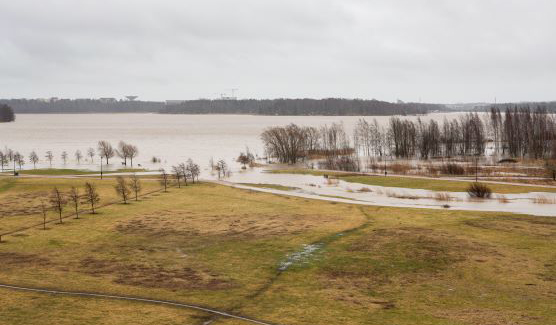
Flooding by the sea coast at Helsinki. © Kai Widell
EU Member States recognise the importance of adapting to impacts of heatwaves, droughts, floods, heavy precipitation and changing temperatures and of mainstreaming climate change adaptation to a wide range of affected areas like agriculture, or water and disaster risk management. These are key findings of a European Environment Agency (EEA) report published today which assesses the state of national adaptation actions in 2021. Two researchers from the Finnish Environment institute (SYKE), Johan Munck af Rosenschöld and Anna Lipsanen, were part of the team of authors.
“This report provides a comprehensive account of how far we have come in climate adaptation in Europe. The report will also serve as a benchmark for future European assessments of reported progress on adaptation“ says Johan Munck af Rosenschöld from the Finnish Environment Institute.
Levels of investment and the financing of putting in place adaptation plans still vary across EU Member States, the EEA report 'Advancing towards climate resilience' found. The assessment gives a snapshot of all EU Member States' national adaptation actions for 2021, based on national reporting submitted to the European Commission (under the Governance of the Energy Union and Climate Action Regulation). Where possible, the report also compares adaptation measures with earlier information to describe progress over recent years. The report also includes some data from Türkiye, which is not an EU Member State but is a member of the EEA.
Progress on adaptation action
National adaptation actions and overall institutional arrangements taking adaptation into account have been further developed and strengthened in many EU Member States to better steer adaptation policies across different levels of government and sectors. Ensuring climate change adaptation priorities are considered in a broad range of policies has also progressed.
Many of the measures reported by EU Member States are about increasing capacity, specifically, activities that support awareness raising, capacity building and training, inclusion of climate change in education, and support adaptation at regional and local levels.
Adaptation is being increasingly financed but several issues remain, including how to measure adaptation finance, as most of these measures also support other economic, social and environmental objectives and are not always initiated for adaptation only. A few Member States have dedicated national adaptation funds for financing the implementation of national adaptation plans, the review found.
Other key findings
- Legal requirements or political commitments to institutionalise periodic updating of climate risk assessments are in place in several Member States. However, their systematic, comprehensive and regular renewal is the exception rather than the rule.
- Most countries still rely on rather soft policies without legally -binding commitments, and on voluntary, informal, non‑hierarchical cooperation. More and more Member States are using national climate laws to have more stringent legal instruments available to enforce their adaptation objectives and strategies.
- The social justice aspects of adaptation are not yet integrated in all countries. However, these increasingly important aspects aim to address the uneven distribution of climate risks, which affect vulnerable groups the most.
- Effective, multi-level governance embodies a variety of networks and a set of collaborative mechanisms across subnational governments. Those networks and collaborations play an essential role in supporting local governments to develop and implement their local adaptation strategies and action plans.
- Monitoring, reporting and evaluation are mainly used for the following three objectives: to gain a better understanding of policy implementation, to identify climate risks, and to measure the effectiveness of policies in reducing climate change impacts, risks and vulnerabilities.
More:
EEA report: Advancing towards climate resilience in Europe: status of reported national adaptation actions in 2021 (eea.europa.eu).
Senior Scientist Johan Munck af Rosenschöld, Finnish Environment Institute, tel. +358 2 952 51513, Johan.MunckafRosenschold@syke.fi